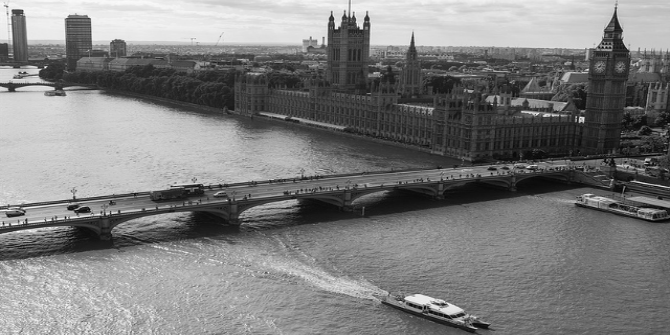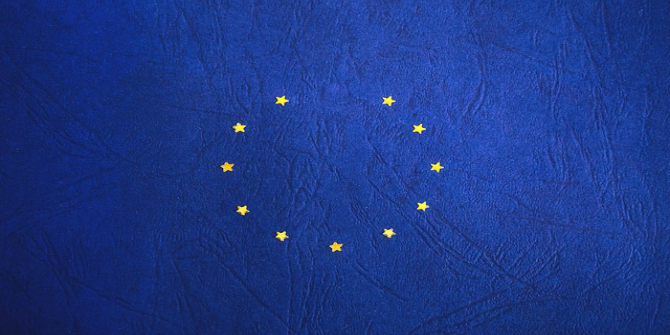 The physical distancing at Westminster is also leading to increased political distancing of government from parliamentary scrutiny, writes David Judge. He explains that the latter has already been happening and is likely to continue, even after the social distancing measures are lifted.
The physical distancing at Westminster is also leading to increased political distancing of government from parliamentary scrutiny, writes David Judge. He explains that the latter has already been happening and is likely to continue, even after the social distancing measures are lifted.
The technical and procedural complexities of transitioning to a virtual parliament, or a quasi-digital ‘hybrid’, have, understandably, been the main focus of attention at Westminster since the outbreak of the Covid-19 crisis. Yet, underpinning the compelling need for digital dexterity and procedural innovativeness has been an unchallenged belief that ‘there is no substitute for parliamentary scrutiny … at this time of national crisis’.
What kind of scrutiny?
In the cauldron of the coronavirus crisis, Lindsay Hoyle, Speaker of the Commons, told the BBC’s Today Programme:
What we need to do is let the government and officials get on with fighting this crisis. It is a crisis for the country. … What I would say is the right kind of accountability should be matched by letting people get on with their job.
In times of crisis, notions of cross-party consensus about an expedient ‘national interest’ tend to frame what constitutes ‘the right kind of accountability’. The Covid-19 crisis provides no exception, with the leaders of all the main opposition parties making clear their commitment to work constructively with the government in the national interest. Equally they, and many other MPs, have made clear that the ‘right kind of accountability’ requires government to be scrutinised to give account exactly as to how the national interest is being pursued and to what effect.
Yet the nature of the pandemic – the very source of the crisis – denies MPs the physical opportunities to meet collectively to examine and investigate the decisions and policies of the executive. Whilst digital technologies have been deployed rapidly to address the frighteningly new reality of social distancing, the more fundamental, and toxic, historic reality of the ‘political distancing’ of UK governments from parliamentary scrutiny remains unaddressed.
Recess and Recall
‘Political distancing’ was evident in the government’s initial decision, on 25 March, to announce an early recess of parliament for Easter. While the extended recess was greeted by some MPs with understanding for the need of parliament to set an example on social distancing, other Members expressed concern that, ‘normally in times of crisis, Parliament is recalled, not closed down’; and that ‘closing this place down early without putting in sufficient measures for online debate and questions is foolhardy at best’. Thereafter, heightened concern was expressed in cross-party calls for the recall of parliament before its scheduled, but uncertain return (other than in a quasi-digital form), on 21 April. In demanding an immediate recall before that date, Caroline Lucas maintained that ‘It isn’t lack of technology that’s preventing recall – it’s lack of political will’.
While MPs during recess remained in physical isolation beyond the Palace of Westminster, the government responded to growing criticism that it was avoiding scrutiny by convening a daily press conference. As the number of press conferences accumulated, however, the inadequacy of such a forum for meaningful scrutiny became increasingly apparent, with some journalists readily acknowledging that the briefings ‘didn’t really amount to public accountability because it was impossible for the journalists to be as fierce and forensic as MPs in the Commons’.
Questions
Lauding Prime Minister’s Question Time as ‘fierce and forensic’ is profoundly ironic. It might be fierce but it is hardly forensic. While absence might make the heart grow fonder, it is judicious to remember that PMQs have been commonly caricatured as ‘Punch and Judy politics’, or as ‘scrutiny by screech’; largely unbeloved by the public; with its very raison d’etre under challenge, and with a recent PM found to deploy an ‘equivocation style’ characterised by ‘ignoring questions, modifying questions … and acknowledging questions without answering them’.
A less dramatic, but routinely more efficacious informatory mode of scrutiny is provided by questions to government ministers – whether oral, written or ‘urgent’. Such questions require ministers to provide information, explain policy decisions or defend departmental actions. In normal times, large numbers of questions are asked by MPs (over 55,000 in 2017-18), many of which relate directly to constituents’ interactions with government departments and state agencies. In the first weeks of the Covid-19 crisis, the number of constituents seeking help and information from MPs increased almost exponentially, at the very time that MPs in recess were unable formally to table questions. Even when parliament reconvenes after 21 April in its hybrid form, the Leader of the House – although committed to facilitating some modified mode of questioning – issued the caveat that ‘Ministers are exceptionally busy at the moment, and it is important that people are reasonable in what they ask for’.
Select committees
In contrast to PMQs, the work of departmental select committees ‘can show a more positive side to Parliament’. Certainly, since their inception some 40 years ago, they have become ‘core features’ of the Commons.
As select committees were enabled, under standing orders, to continue their work during recess, and were also temporarily empowered to hold virtual sessions, they attracted widespread and positive attention. Indeed, their preferred mode of working, where ‘Members are encouraged and enabled to leave narrow party interests at the door and to work in a more collaborative and evidence-led manner’, proved to be of immediate value in investigating the fluctuating and challenging policy responses to Covid-19.
But, and it is a big but, while the desirability of cross-party consensus has been emphasised in the immediacy of the government’s reaction to Covid-19, what the past experience of select committees reveals is that building consensus is not always easy in an adversarial political context. The search for consensus can limit the choice of committee enquiries and defuse the potency of committee recommendations. Hence, should committees choose to self-isolate in partisan terms then a form of ‘remit political distancing’ might restrict the scope and robustness of Covid-19 enquiries. The zealousness with which committees map out the boundaries of these inquiries – committees dominated numerically by Conservative members and with former cabinet ministers as some of their chairs (most notably Jeremy Hunt) – may be inhibited by divergent partisan perspectives on, for example, the extent to which the policies of successive Conservative governments adversely affected the UK state’s crisis-response capacities.
More directly, the powers of select committees ‘to send for persons, papers and records’ have inhered within them a potential for executive political distancing. In the case of ministers, they are ‘collaterally exempt’, in that they cannot be compelled to appear before a committee. While this has not proved to be a significant problem in the past, the reluctance of Priti Patel to accept the Home Affairs Committee’s numerous requests to explain her department’s response to Covid-19 reveals the contingent nature of such requests. It is also worth recalling that the PM’s chief special adviser, Dominic Cummings, has been admonished by the House of Commons Privileges Committee for contempt of parliament in refusing, in his former role as campaign director of Vote Leave, to appear before the Digital, Culture and Sport Committee.
Unlike ministers, and Dominic Cummings, civil servants have no independent discretion in appearing before select committees if so requested. Nonetheless, there have been ‘some struggles’ with ministers to allow named officials to attend. When civil servants provide evidence to committees they do so ‘not in a personal capacity but as representatives of their ministers’. This has led to some Sir Humphrey style, politically opaque, exchanges between senior civil servants and committee members. In an era when, as one former permanent secretary argues, senior civil servants are ‘struggling to win the trust of small-state politicians surrounded by clamorous special advisers and instinctively suspicious of departmental advice’, there is a heightened possibility that the pressures on officials to be bound by ministerial political distancing strategies will only increase.
Legislation
Parliament provided scant scrutiny of the Coronavirus Act 2020. Some 239 pages long, and containing the ‘most draconian powers ever proposed in peace-time Britain’, the legislation was fast-tracked through parliament in just four sitting days. The government made only one concession, in response to widespread concern within and beyond Westminster, to allow an amendment to enable MPs to vote every six months to keep the Act’s temporary provisions in force.
Only a few months before the Coronavirus Act, the passage of the EU (Withdrawal Agreement) Act 2020 had provided the government with a trial run at ramming through legislation at breakneck speed. At some 100 pages in length, the Withdrawal Agreement Act completed its parliamentary stages in 12 sitting days with ‘remarkably for a bill of such complexity and significance, not a single amendment made it into the final text’.
Manifestly, each of these Acts are exceptional, both in the circumstances leading to their passage and in the scope of their provisions. They are also exceptional in the extent to which they were packaged within a wider parcel of secondary legislation to achieve their objectives. The extent to which the executive can politically distance itself from parliamentary scrutiny through the use of statutory instruments has long been of concern. They have not been dubbed Henry VIII powers for nothing. Thus, in the case of Brexit, the Hansard Society have pointed out that ‘much of the detailed implementation of Brexit will be done by the executive with limited parliamentary oversight’. Similarly, the implementation of coronavirus measures through the use of statutory instruments will be ‘politically distanced’ from parliamentary scrutiny.
Exit strategies
Increasingly, calls are now being made for the UK government to formulate and eventually implement an exit strategy from the ‘lockdown’ of social distancing. The assumption is that the current imperatives of physical distancing will slowly recede. When physical distancing eventually decreases at Westminster, the virulence of political distancing of government from parliamentary scrutiny will continue to infect the Commons. Calls for an exit strategy from such political distancing are unlikely to be listened to at a time of crisis, nonetheless, they should be made.
____________________
 David Judge is Professor Emeritus of Politics at the University of Strathclyde.
David Judge is Professor Emeritus of Politics at the University of Strathclyde.
All articles posted on this blog give the views of the author(s), and not the position of LSE British Politics and Policy, nor of the London School of Economics and Political Science. Featured image credit: by Makenna Entrikin on Unsplash








2 Comments